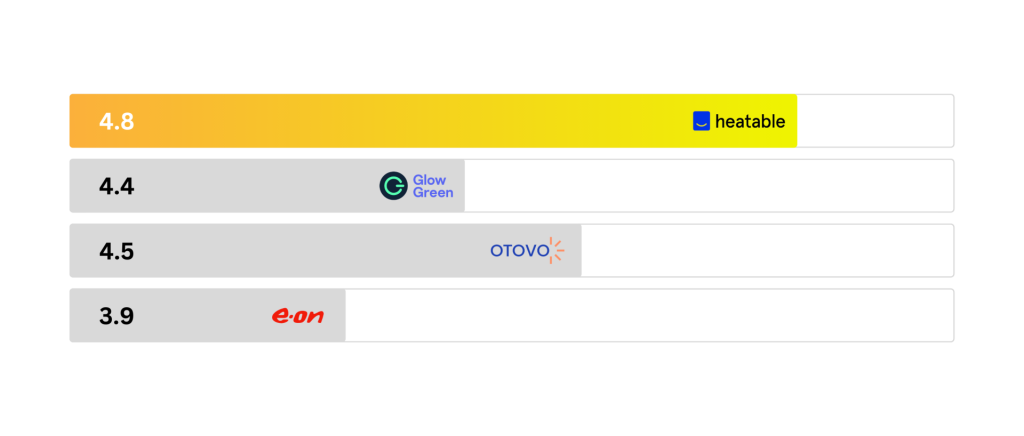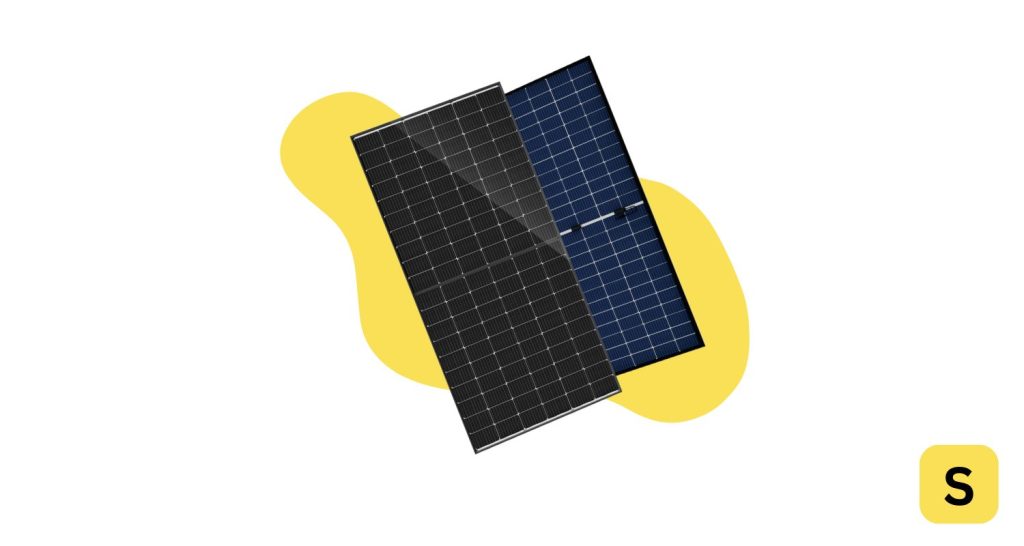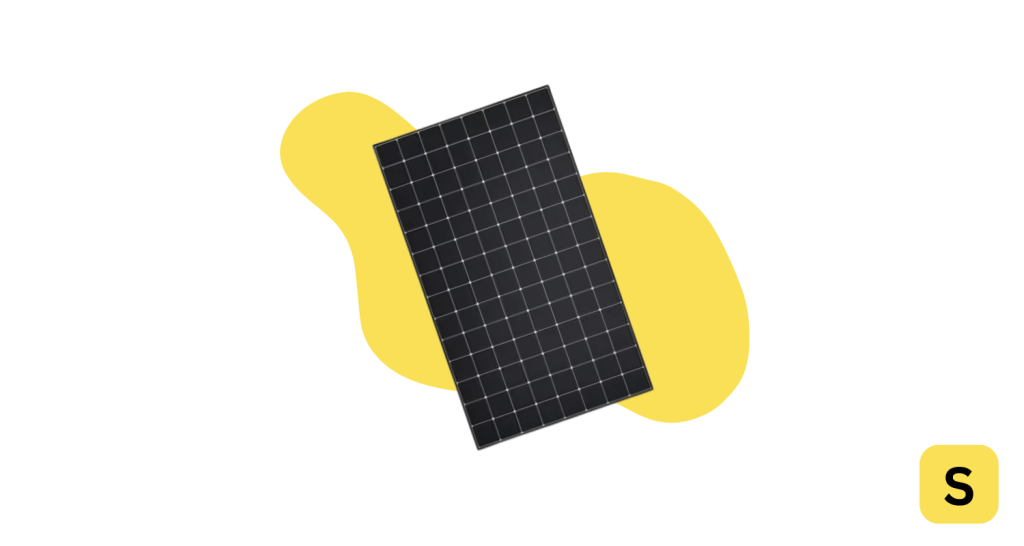Solar panel efficiency is a crucial factor when selecting panels for your home. Higher efficiency means more electricity generation from the same surface area, resulting in greater savings, reduced carbon emissions, increased energy independence, and optimal use of available roof space.
According to the Energy Savings Trust, a well-designed solar panel system can reduce annual energy bills by up to £600 and cut carbon emissions by approximately one tonne per year, depending on your location and solar electricity usage patterns.
Pro tip: Avoid upsells and confusing packages—choose a provider with a clear, fixed-price quote that won’t change. Heatable, a Which?-approved solar installer, offers transparent pricing with no surprises.
What Does Solar Panel Efficiency Mean?
Solar panel efficiency measures the percentage of sunlight (solar irradiance) that a panel converts into usable electricity. For instance, a panel with 19% efficiency transforms 19% of the solar energy it receives into electrical power, while the remaining 81% is reflected away.
Most residential solar panels available today offer efficiency ratings between 15% and 22%. Technological advancements have enabled some premium models to exceed 22% efficiency, though these typically command higher prices.
How Is Efficiency Measured?
Manufacturers determine efficiency ratings under Standard Test Conditions (STC), which involve:
- Maintaining panel temperature at precisely 25°C
- Exposing panels to controlled light sources at 1,000 watts per square meter
- Calculating the percentage of light converted to electricity
It’s important to note that real-world performance often differs from STC ratings due to variations in sunlight intensity, ambient temperature, and wind conditions. Some manufacturers also provide Performance Test Conditions (PTC) ratings, which offer more realistic efficiency estimates across various environmental scenarios.

Key Factors Affecting Real-World Efficiency
Installation Position
Panel placement significantly impacts efficiency. In the UK, south-facing installations receive optimal sunlight exposure. Roof pitch also matters, with angles between 30-45 degrees generally providing the best year-round performance.
Shading Issues
Even partial shading can dramatically reduce efficiency—studies show up to 50% losses from modest shading. Professional installers should conduct thorough shading analyses to identify potential obstructions from trees, buildings, chimneys, or other structures.
Temperature Effects
Contrary to what many assume, solar panels perform better in cooler conditions. Efficiency typically declines as temperatures rise above 25°C, though panels continue functioning even during heat waves.
Cut Your Energy Bills with Solar in 90 Seconds
Get your free fixed-price quote from Heatable — a Tesla Premium Installer with no hidden fees or sales pressure.
- ✔ MCS-accredited & Which? Trusted Trader
- ✔ Fixed price guarantee — no surprise costs
- ✔ Finance available & deposit protection
- ✔ Rated 4.9★ by thousands of UK homeowners

Panel Technology
The three main panel types offer different efficiency profiles:
- Monocrystalline Panels: Made from single silicon crystals, these offer the highest efficiency (typically 20-22%) but at premium prices.
- Polycrystalline Panels: Constructed from multiple silicon fragments, these provide moderate efficiency (17-19%) at more accessible price points.
- Thin-Film Panels: These lightweight, flexible panels offer lower efficiency (10-15%) and faster degradation rates but cost less and work well in specific applications.
2025’s Most Efficient UK Solar Panels
REA Fusion Energy Solar Panels

The REA Fusion solar panels are bifacial, meaning they absorb light on both sides. They feature high-efficiency N-type M10 Topcon solar cells and offer a seamless, sleek design in silver or black.
They can achieve efficiencies of 22% to 24% and are micro-inverter optimised to maximise the performance of each panel independently.
Best of all, REA Fusion solar panels can generate electricity even in low light conditions, making them ideal for the UK weather, where cloudy days are more common.
Prices range from £400 to £420 per panel, and they come with a 25-year insurance company-backed product & performance warranty.
- Efficiency: 22-24%
- Features: Bifacial design captures light from both sides
- Technology: N-type M10 Topcon cells
- Performance: Excellent in low-light conditions
- Warranty: 25-year insurance-backed guarantee
- Price range: £400-£420 per panel
SunPower Maxeon 6 AC

The SunPower Maxeon 6 AC solar panels feature an efficiency rating of 22.8% with a powerful output of around 440 watts. They come with a 40-year product warranty and a guarantee that the panels will maintain 92% of their original performance after 25 years.
The Maxeon 6 AC panels are also recyclable, making the product very eco-friendly. However, they can be a bit heavy, with a weight of around 21.8kg.
- Efficiency: 22.8%
- Output: Approximately 440 watts
- Warranty: 40-year product coverage, 92% performance guarantee after 25 years
- Environmental impact: Fully recyclable
- Weight: 21.8kg per panel
SunPower Maxeon 3

The Maxeon 3 solar panels from SunPower feature an energy efficiency rating of 22.7% and offer a power output of around 430 watts. It comes with a 40-year product warranty and a performance warranty of 88.25% after 40 years.
The Maxeon 3 is resistant to heat and is an excellent eco-friendly choice since the panels are recyclable.
Each Maxeon 3 panel weighs 21.2kg, and you can expect to pay around £300 to £350 per panel.
- Efficiency: 22.7%
- Output: Around 430 watts
- Warranty: 40-year product coverage, 88.25% performance guarantee after 40 years
- Heat resistance: Excellent thermal performance
- Weight: 21.2kg per panel
- Price range: £300-£350 per panel
Related solar guides:
- How many solar panels do you need?
- Smart Export Guarantee
- Can you install solar panels in a conservation area?
- Best 4kw solar system with battery storage
- Sunshine hours map UK
- Best Solar Panels
- Solar panel output calculator
Conclusion
While solar technology continues advancing, with researchers consistently pushing efficiency boundaries, today’s high-efficiency panels already offer excellent returns on investment. When selecting solar panels, aim for efficiency ratings of 20% or higher to maximize long-term benefits.
Balancing efficiency with cost, aesthetics, and lifespan considerations will help you identify the optimal solar solution for your specific needs and circumstances.
Sources:
- Energy Saving Trust: https://energysavingtrust.org.uk/advice/solar-panels/
- MDPI Energies Journal: https://www.mdpi.com/1996-1073/16/3/1169
